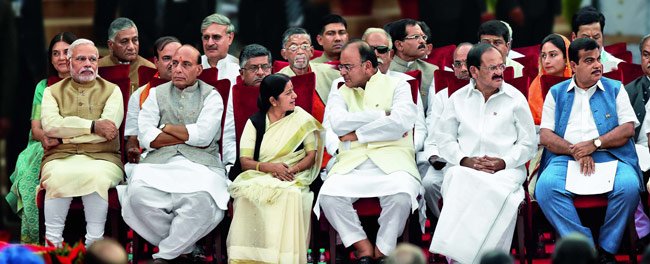 Indias new Prime Minister Mr. Narendra Modi was sworn in on 26th May, 2014. As the 15th Prime Minister of the democratic, republic of India. As a man who has risen from a humble back ground, Mr. Modi is India’s first Prime Minister to be born after Indian independence from the British in 1947.
Indias new Prime Minister Mr. Narendra Modi was sworn in on 26th May, 2014. As the 15th Prime Minister of the democratic, republic of India. As a man who has risen from a humble back ground, Mr. Modi is India’s first Prime Minister to be born after Indian independence from the British in 1947.
Mr. Modi’s political ascent has been powerful and courageous. While he is reputed for transforming the Western state of Gujarat from an agricultural state to one of modern technology and manufacturing he is also accused in the Gujarat communal riots of 2002, where hundreds of innocent people lost their lives.
Mr. Modi, who won by a sweeping majority has taken control of 282 seats in India’s lower house. Political analysts who expected this change, have attributed his success also to the fall of the Congress government which had held power in India since the past decade. Tired of being controlled by one political party, a lack of progressive policies and flax decision making coupled with high costs and a plunging economy, more than 800 million Indians voted for change. In a multi-part election process that is now the world’s largest democratic exercise, Indians collectively and decisively voted for better governance, and now that Mr. Modi has won majority power, he will need to deliver on his election promises.
To help Mr. Modi, his key people have been given ministerial posts and a 100 day agenda to improve efficiencies in India. Promising a leaner, cleaner and more productive government below are the key people within Modi’s government that will play a larger role for China.
- Sushma Swaraj – External Affairs Minister – 62, has been given the role of Minister of Foreign Affairs, becoming the first woman to do so in Indian history. Swaraj, a veteran politican and a reputed speaker, has in the past handled the office of information and broadcast, and health care, and for a brief period of time in 1998 was the chief minister of the state of New Delhi. Most recently, she was the leader of the opposition, representing the BJP in the parliament’s lower house. Mrs. Swaraj, will have a tough time managing not only India’s borders, but also international allies that are increasingly asserting themselves within the Asian region.
- Mr. Arun Jaitley – Minister of Finance and Corporate Affairs — 61, a lawyer who has in the past led Indian delegations to the former Soviet Union, Europe, and U.S. has also twice before been the law minister. He served as commerce minister in a previous BJP government which was in power 1998-2004. Jaitley is the most powerful member of the new government after Modi. His responsibilities will include and not be limited to strengthening the Indian economy and driving efficiencies back into a system that carries a million dreams.
- Mr. Rajnath Singh – Home Minister — 62, who is also the president of the Bharatiya Janata Party, or BJP, is the former chief minister of the northern state of Uttar Pradesh from 2000 to 2002, Singh has also been minister for agriculture, education and surface transport, during his political career. The Home Affairs ministry is a significant one, being responsible for the management of internal security and the country’s international borders, as well as managing parts of the strife-torn region of Jammu and Kashmir.
- Mrs. Smriti Irani – Minister of Human Resource Development — at 38, she is the youngest Minister within the current cabinet. Mrs. Irani’s meteoric rise is the stuff of legend. Her rise from a simpler life to a famous Tv actress to one of India’s most important portfolio’s, shows that Mrs Irani’s spunky personality comes with brains and hard work. Smriti, who has also learnt Mandarin, is part of the 7 powerful women in the cabinet. Her role will encompass education and literacy a vital role to build skills for the India of the future.
- Mr. Venkaiah Naidu – Minister for Urban Development – A rural development minister in the Vajapyee cabinet from 1998-2004, Naidu has also served as president of the BJP. He is widely seen to be a hard worker and follows the party line studiously. Modi will lean on him to deliver in his ministry as urban infrastructure proves to be a crucial indicator of the success of the current government.

